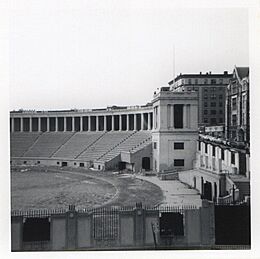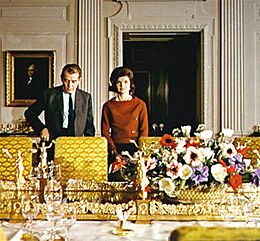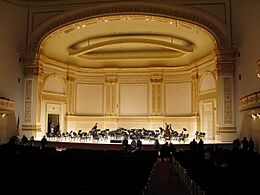Alfredo Antonini facts for kids
Quick facts for kids
Alfredo Antonini
|
|
|---|---|
| Born |
Alfredo Antonini
May 31, 1901 |
| Died | November 3, 1983 (aged 82) |
| Occupation | Conductor, Composer, Musical Director |
| Years active | 1921–1977 |
| Spouse(s) | Alexandra Catherine Pasimeni (m. 1948) |
| Awards | Emmy Award Order of Merit of the Italian Republic |
Alfredo Antonini (born May 31, 1901 – died November 3, 1983) was a famous Italian-American conductor and composer. He was very active in concerts around the world. He also worked a lot on the CBS radio and television networks from the 1930s to the early 1970s. In 1972, he won an Emmy Award for his work on a TV show. This award was for his conducting of an opera called And David Wept for CBS television. In 1980, he also received the Order of Merit of the Italian Republic, which is a special award from Italy.
Contents
About Alfredo Antonini
Alfredo Antonini was born in Alessandria, Italy. He studied music at the Royal Conservatory in Milan. He learned from the famous Italian conductor Arturo Toscanini. Alfredo first met Toscanini when he was only thirteen years old. At that time, he was playing an instrument called the celesta in a show called Petrouchka.
Before moving to the United States in 1929, he was a talented organist and pianist. He played with the La Scala Orchestra in Milan. His father was also a musician and played with the Buenos Aires Opera in Argentina. Alfredo's wife, Sandra, was a piano player and voice teacher too.
His Work in the 1940s: Radio
During the 1940s, Alfredo Antonini became a well-known conductor on CBS Radio. He led several important orchestras. These included the CBS Pan American Orchestra from 1940 to 1949. This orchestra was part of a special effort by the US government. It aimed to share culture and music between countries during World War II.
He also conducted the Columbia Concert Orchestra and the CBS Symphony Orchestra. His performances with the CBS Pan American Orchestra were very important. They helped introduce Latin American music and the Mexican bolero to many people in the United States.
Live Radio Shows
In the 1940s, Antonini conducted live radio shows like Viva America. These shows were on CBS Radio and La Cadena de las Americas. He worked with many international artists. Some of these included Nestor Mesta Chayres, Juan Arvizu, and Kate Smith.
He also performed with Nestor Chayres and the New York Philharmonic. They played in the Night of the Americas Concert series at Carnegie Hall. These concerts were very popular. He also performed with Juan Arvizu and the CBS Tipica Orchestra at Carnegie Hall.
In 1946, Antonini recorded many popular Latin American songs. These were on an album called Latin American Music - Alfredo Antonini and Viva America Orchestra. Critics praised his conducting skills. They called the album one of the best new Latin American music collections.
Later in the 1940s, Antonini worked with singer Victoria Cordova. They recorded songs that were popular in both North and South America. He also worked with the group Los Panchos Trio. They recorded a Chilean dance song called La Palma.
In 1948, Antonini conducted the first show of the CBS Symphony Summer Series. This was broadcast live on CBS Radio. He also worked with famous musicians like Julius Baker and Mitch Miller. His performances with the CBS Symphony Orchestra were also broadcast by the Voice of America. His recordings were even used by the Armed Forces Radio Network for soldiers.
His Work in the 1950s: Opera

In the 1950s, Alfredo Antonini taught music at St. John's University in New York. He taught a course called Music Appreciation. As a music director for CBS Television, he helped bring classical music and opera to many people.
He worked with Julie Andrews, Richard Rodgers, and Oscar Hammerstein II. They created a TV show of Cinderella. This show was watched by 107 million people in 1957. He also performed with famous opera singers like Eileen Farrell and Beverly Sills. In 1957, he became the music director for the Tampa Philharmonic Orchestra.
In 1951, he was the leader for both the orchestra and choir for the CBS Radio show Music Land U.S.A. This show featured talented singers. His performances were also sent to American soldiers around the world by the Armed Forces Radio Network.
Antonini also conducted open-air summer concerts at Lewisohn Stadium in New York City. He performed there every year from the 1940s to the 1960s. He often featured famous singers from the Metropolitan Opera. His "Italian Night" concerts with the New York Philharmonic Symphony Orchestra often had over 13,000 guests. These shows featured songs from Italian operas.
His Work from the 1950s to 1970s: Television
Alfredo Antonini's work with CBS soon moved to television. He composed music and led the CBS Orchestra for the documentary series The Twentieth Century (1957-66). He also conducted for the American Musical Theater documentary series (1959).
Other TV shows he worked on included the religious program Lamp Unto My Feet. He also worked on special shows like Cinderella and The Fabulous Fifties.
Antonini continued to work with famous musicians. In 1960, he conducted for Benny Goodman at Lewisohn Stadium. He also conducted the Symphony of the Air for a CBS TV special called Spring Festival of Music. This show featured pianist John Browning.
In 1962, Antonini worked with First Lady of the United States Jacqueline Kennedy. They created a TV documentary called A Tour of the White House with Mrs. John F. Kennedy. More than 80 million people around the world watched this show. It received a lot of praise.
In 1964, Antonini conducted the CBS Symphony Orchestra for a TV show. It was an adaptation of Hector Berlioz's oratorio L'enfance du Christ. He also conducted for a TV episode of The CBS Repertoire Workshop. This show featured Puerto Rican-American performers like Martina Arroyo.
Besides his work on WOR radio in New York City, he was a guest conductor for orchestras in Chicago, Milwaukee, and Norway. He also founded the Tampa Philharmonic Orchestra in Florida. In the 1960s, Antonini conducted with the New York Philharmonic at Philharmonic Hall. He worked with famous opera singers like Jan Peerce, Robert Merrill, and Franco Corelli. He also performed with Roberta Peters at the Lewisohn Stadium.
In 1971, Antonini was the music director for the CBS Television premiere of Ezra Laderman's opera And David Wept. For this, he won an Emmy Award in 1972. He worked with opera stars like Sherrill Milnes and Rosalind Elias. In 1975, he worked on another CBS TV movie called A Handful of Souls.
Antonini worked with many important people at CBS Television. These included people from different fields:
- Government: Jacqueline Kennedy Onassis
- Journalism: Charles Collingwood, Walter Cronkite
- Art: Henry Moore
- Dance: Mary Hinkson
- Acting: Julie Andrews, Henry Fonda, Jackie Gleason
- Concert Stage: John Browning
Death
Alfredo Antonini passed away at age 82 in 1983. He died during heart surgery in Clearwater, Florida. He was buried in Sylvan Abbey Memorial Park cemetery. He was survived by his wife Sandra and his son.
Compositions
- The Great City
- Sarabande
- Sicilian Rhapsody
- Suite for Cello and Orchestra
- Preludes for Organ
- Suite for Strings
- The United States of America, Circa 1790
- Mambo Tropical
Discography
Alfredo Antonini conducted on many recordings. Here are some of them:
- Cinderella, with singer Julie Andrews, Columbia Masterworks (1957)
- American Fantasy, SESAC Records
- Atmosphere By Antonini - Alfredo Antonini and His Orchestra, Coral Records (1956)
- Romantic Classics, SESAC Records
- Aaron Copland/Hugo Weisgall/Alfredo Antonini - Twelve Poems of Emily Dickenson, Columbia Masterworks (1956)
- Songs from Sunny Italy - Richard Tucker with Alfredo Antonini Conducting the Columbia Concert Orchestra, Columbia Masterworks (1950)
- Alfredo Antonini and His Orchestra - Dances of Latin America, London Records (1950)
- Alfredo Antonini & The Columbia Concert Orchestra, soloist Richard Tucker, Columbia Masterworks
- Nestor Chayres Singing Romantic Songs of Latin America, Alfredo Antonini conductor, Decca (1947)
- Juan Arvizu, Troubador of the Americas, Alfredo Antonini conductor, Columbia Records (1941)
- Latin American Music - Alfredo Antonini and Viva America Orchestra, Alfredo Antonini conductor, Elsa Miranda vocalist, Alpha Records (1946)
- Richard Tucker: Just For You with Alfredo Antonini and the Columbia Symphony Orchestra, Columbia Masterworks
- Amapola (Joseph Lacalle), vocalist Nino Martini, Columbia
- Bolero - No Me Lo Digas (Maria Grever), vocalist Nino Martini, Columbia
- Nestor Chayres & Alfredo Antonini, Decca
- Granada (Agustin Lara), vocalist Nestor Chayres, Decca (1946)
- Noche de Ronda (Maria Teressa Lara), vocalist Nestor Chayres, Decca (1946)
- La Palma, Los Panchos Trio, Pilotone
- Rosa Negra, Alfredo Antonini Viva America Orchestra, Pilotone
- Alfredo Antonini and The Viva America Orchestra - Chiqui, Chiqui, Cha/Caminito De Tu Casa, Bosworth Music
- Music of the Americas, Pilotone Album
- La spagnola (V. Di Chiara), vocalist Carlo Morelli, Columbia
- Alma Mia (Maria Grever), vocalist Carlo Morelli, Columbia
- Viva Sevilla! and Noche de Amor vocalist Juan Arvizu, Columbia
- Mi Sarape and Que Paso? vocalist Juan Arvizu, Columbia
- El Bigot de Tomas and De Donde? vocalist Juan Arvizu, Columbia
- Canta Il Marie (Mazzola) and Si Alguna Vez (Ponce) vocalist Carlo Morelli Columbia
- Esta Noche Ha Pasado (Sabre Marrequin) vocalist Luis G. Roldan, Columbia
- Tres Palabras (Osvaldo Farres) vocalist Luis G. Roldan, Columbia
Filmography

Jacqueline Kennedy and
Charles Collingwood
Charles Collingwood murrow27s boys
Alfredo Antonini worked as a conductor or music director for many TV shows and movies:
- A Handful of Souls - (TV Movie, Conductor, 1975)
- And David Wept - (TV Movie, music director, 1971)
- Gauguin in Tahiti: The Search for Paradise - (TV Documentary, Conductor, 1967)
- The Emperor's New Clothes - (TV Movie, Conductor, 1967)
- The Twentieth Century - Nehru: Man of Two Worlds - (CBS-TV, Conductor, 1966)
- Where the Spies Are - (Film, Conductor, 1966)
- CBS Reports - (TV Documentary series, Conductor, 1965)
- The Twentieth Century - The Nisei: The Pride and the Shame (CBS Documentary, Conductor, 1965)
- Jack and the Beanstalk - (TV Movie, Conductor, 1965)
- Pinocchio (TV Movie, Conductor, 1965)
- L'Enfance du Christ - (TV Movie, Conductor, 1964)
- CBS Repertoire Workshop - (TV Series, Conductor, 1964)
- The Twentieth Century - (CBS-TV Documentary Series, musical director, conductor, 1957-66)
- Arias and Arabesques - (TV Movie, Conductor, 1962)
- Cabeza de Vaca - (TV Movie, Conductor, 1962)
- A Tour of the White House - (TV Documentary, musical director, 1962)
- An Act of Faith - (TV Movie, musical director, 1961)
- Twenty-Four Hours in a Woman's Life - (TV Movie, Conductor, 1961)
- And On Earth, Peace - (TV Movie, Composer, 1961)
- Spring Festival of Music: American Soloists - (TV Movie, Self, 1960)
- The Right Man - (TV Movie, Conductor, 1960)
- The Fabulous Fifties - (TV Documentary, musical director, 1960)
- The Twentieth Century - The Movies Learn to Talk - (CBS documentary, Conductor, 1959)
- The American Musical Theater (CBS-TV documentary series, Conductor,1959)
- The Twentieth Century - The Incredible Turk (TV Documentary, Conductor, 1958)
- The Seven Lively Arts - (TV Series, musical director, 1957)
- Air Power - (TV Documentary, musical director, 1956–1957)
- Cinderella - (TV Special, music director, 1957)
- Studio One: Circle of Guilt - (CBS-TV, Conductor, 1956)
- Studio One: Dino - (CBS-TV, music director, 1956)
- Studio One: Star-Spangled Soldier - (CBS-TV, Music, 1956)
- Studio One in Hollywood - (TV Series, music director, 1954)
- Studio One: Dark Possession - (CBS-TV, Musical consultant, 1954)
- Studio One: Let me Go, Lover - (CBS-TV, music director, 1954)
- Studio One: Dry Run - (CBS-TV, Music, 1953)
- The Jane Froman Show - (TV Series, Conductor, 1952)
- The Cabinet of Dr. Caligari - (TV Movie, Composer, 1920)
Awards
- Primetime Emmy Award for Outstanding Achievement in Religious Programming (1972)
- Award for Distinguished Service to Music from the National Association for American Composers and Conductors
- Title of Commendatore awarded by the President of Italy (1977)
- Order of Merit of the Italian Republic (1980)
Archived Works
- Some of Alfredo Antonini's music scores from CBS television are kept at the New York Public Library for the Performing Arts.
- Some of his sound recordings with the CBS Symphony Orchestra for Voice of America are also at the New York Public Library.
- His concert programs, music scores, and other documents are available online. You can find them at the New York Philharmonic - Shelby White and Leon Levy Digital Archives.
Professional Groups
- American Society of Composers, Authors and Publishers ASCAP (1948)



